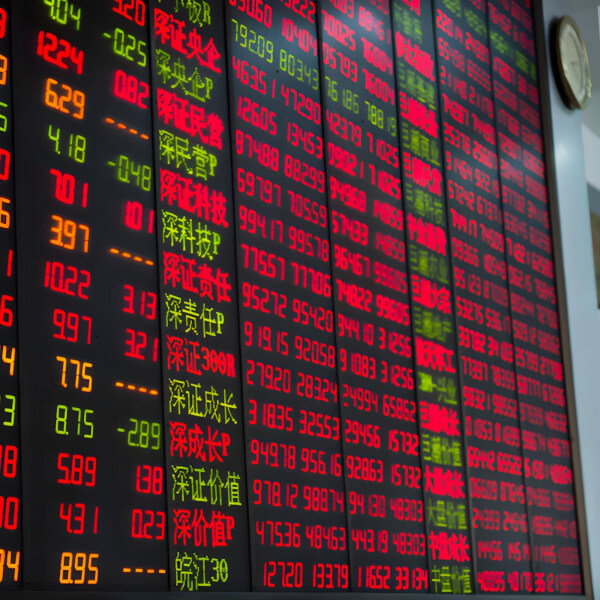As we start a new week, the focus is once again on tariffs and earnings reports. The clock is ticking on the deadline for the US to reach trade agreements with the EU, Canada and Mexico. These are the US’s largest trading partners, and if their tariff rates surge to 35% for Canada and 30% for the EU and Mexico, then the limited impact of tariffs on economic growth so far may not last.
Financial markets have not been too worried about the tariff risks thus far. Boeing, which is expected to be a target of EU retaliatory tariffs, has seen its share price rise by 15% in the past month. The Eurostoxx 50 index fell slightly last week but is still higher by more than 2.5% in the past month, and there is no sign that the EU’s largest exporters are seeing their share prices hit by tariff threats. For example, over the last month, Ferrari, Pernod Ricard and Airbus, have seen their share prices rise by 8%, 6.5% and 14% respectively, defying tariff fears.
The latest news on tariffs is mixed. Over the weekend US Commerce Secretary, Howard Lutnick, said that he hoped a trade agreement would be reached between the US and the EU, but that the August 1st deadline was hard, although no previous deadline from the US has been that hard so far. Early on Monday the news was less positive, with reports suggesting that the new universal tariff on all EU goods will be above the current rate of 10% with fewer exemptions. Voices are also getting louder in the EU about retaliatory measures including new taxes on US tech giants, which could disrupt negotiations even further. Thus, after six consecutive months of gains for the euro, and EUR/USD higher by 12% so far this year, the risk is that negative trade headlines hit the euro as we lead up to the August 1st deadline. EUR/USD has come under pressure in the past week, and is testing the $1.1650 level this morning, if it fails to extend gains from here, then it could be a sign that sentiment is draining from the euro as we near the tariff deadline.
At the start of the new week, stocks are lower in Europe and US equity futures are higher. European and UK bond yields are lower across the curve, which could limit euro and pound upside if they continue, although the dollar is a key underperformer in the G10 FX space this morning. There are some drivers of markets this morning including news that 60 German companies have unveiled investment of at least EUR 100bn to boost Germany’s planned growth and development program. This is a coup for new Chancellor Friedrich Merz. This is designed to stop the outflow of investment that has plagued Germany in recent years. The hope is that this will boost growth in the economy. We doubt that today’s news will have a big impact on the Dax, as a lot of the good news is already priced in, the Dax is higher by 22% so far this year, and the domestically focused Mdax is higher by a similar amount. This is a big opportunity for some of Germany’s biggest companies, including Deutsche Bank, who could benefit from demand for alternatives to US banks.
There have been some key earnings announcements, including Stellantis, which reported a larger than expected loss this morning, as the impact of 25% tariffs on auto exports to the US starts to bite. While Stellantis has its own issues, including expensive restructuring costs, this could still be a warning sign for other European car manufacturers as we await their earnings, Volkswagen will release earnings at the end of this week. In contrast, Ryanair reported a strong set of figures in a sign that European travelers are shunning long haul in favour of short haul destinations this summer.
As we look to this week, there are a few key events that will drive markets. We choose the most impactful ones below.
1, ECB meeting: wait and see how tariff drama plays out
There is no expectation of a rate cut from the ECB this week, with the rate cutting cycle expected to start again later this year. There is currently more than 30 bps of cuts expected from the ECB by the end of this year. Current market pricing suggests that we are getting close to the end of this rate cutting cycle for the ECB, and we expect that the ECB will suggest that this is the case. For example, the ECB’s bank lending survey is released on Tuesday, and a rise in demand for mortgages could be a sign that monetary policy is now accommodative, The ECB will want to tread carefully at its meeting this week, because of the US tariff threat on August 1st. If tariffs are implemented on pharmaceutical exports, then this could hit Eurozone growth and demand more rate cuts than currently expected.
ECB members continue to lean towards dovish rhetoric, according to a Bloomberg central bank speak index, which has been emboldened by the disinflation process that continues in the Eurozone. Thus, we expect the ECB’s statement to acknowledge both progress on inflation and the risks from US tariffs. Due to the ECB’s wait and see mode, we do not expect this meeting to be too market moving.
2, Global PMI reports; green shoots expected for the UK
The early reading of July PMI reports are released this week. The UK figures will be watched closely as the UK desperately tries to search for growth. The survey data has been stronger than the real economic data over Q2, and we expect there to be some good news included in the July report. Signs that cost pressures are easing will be welcome news for the UK government. There could also be signs that the UK economy will grow at a faster rate in Q3 compared to Q2. The employment balance may temper optimism from this survey. There have been clear signs that the UK labor market is softening, and we expect this to be reflected in the July PMI report. If the report is stronger than expected, we could see a boost in the pound.
In Europe, the export orders component will be the focus. Overall, this index has been weak in 2025, as tariffs and a slowdown in the US economy bite. Thus, the Eurozone PMI could signal a muted start to Q3 growth.
3, Earnings reports: can tech prove that AI spend is paying off?
The reporting season will heat up this week, with Google and Tesla earnings the highlight. Overall, 100 S&P 500 companies will report earnings this week, and expectations are high after a solid start for earnings season, especially from US financials. Alphabet and Tesla will both report earnings on Wednesday evening, after US markets close. Analysts expect Google to report double digit earnings and revenue growth. Google could report stronger advertising spend, and crucially, for the stock price, signs that AI investments are starting to pay off, and AI monetization is boosting results in Google’s search business. Cloud is also an important part of the business, so these results will be watched closely. Cloud strength could come from more businesses adopting AI. Thus, we are moving into the monetization phase of AI, and Google will be a key litmus test for the tech sector. If its AI investments pay off, then it may ignite another rally in tech stocks, especially those with AI exposure.
Tesla will also report this week, Last quarter, Tesla reported a 20% drop in auto revenue, and the bar is low for Q2. The market expects a 20% drop in earnings YoY, although there is some confusion about Tesla earnings leading up to this report. There could be further weak sales, but Tesla is the ultimate growth stock, and if the earnings call presents a positive opportunity for the robotaxi revenue possibilities, and the company’s AI investments, then the stock could shine.
Tesla’s shares have tended to rise in recent quarters, even with earnings misses, and the average move in the share price 24 hours after an earnings report is 10%. The share price has been rising as we lead up to this report, and it is higher by nearly 4% in the past month. Thus, it may take a negative report to weigh on Tesla’s share price.

Three markets to watch next week (27.02.2026)

Daily summary: The beginning of the end of disinflation?

Wheat at its highest level in 8 months 📈

Jane Street: Legendary market maker in the court
This content has been created by XTB S.A. This service is provided by XTB S.A., with its registered office in Warsaw, at Prosta 67, 00-838 Warsaw, Poland, entered in the register of entrepreneurs of the National Court Register (Krajowy Rejestr Sądowy) conducted by District Court for the Capital City of Warsaw, XII Commercial Division of the National Court Register under KRS number 0000217580, REGON number 015803782 and Tax Identification Number (NIP) 527-24-43-955, with the fully paid up share capital in the amount of PLN 5.869.181,75. XTB S.A. conducts brokerage activities on the basis of the license granted by Polish Securities and Exchange Commission on 8th November 2005 No. DDM-M-4021-57-1/2005 and is supervised by Polish Supervision Authority.


